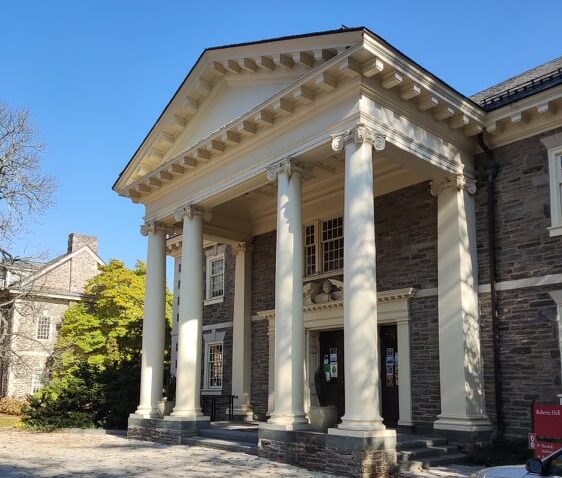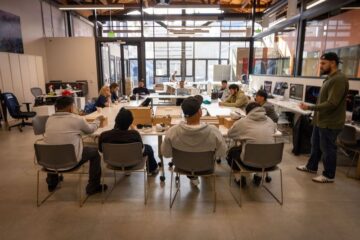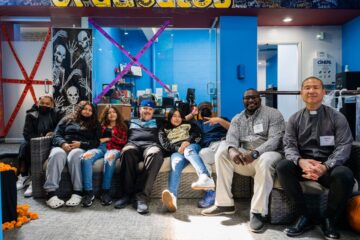Haverford 2020-2021
This year Haverford had many challenges. Luckily, they were able to host students on campus in both the fall and spring semester. They had some in person learning with no covid outbreaks on campus. Haverford was able to navigate the covid environment and manage the financial costs it brought. However, there were student strikes that pointed out the structural racism that existed within Haverford. This led to the creation of the THRIVE initiative (truth, healing, resilience, inclusion and equity). Jill’s course and teach-ins also helped students work through the issues they were protesting about. The following will outline the activities ORFL supported.
Peace, Justice and Human Rights and Peace and Conflict Studies
Peace, Justice and Human Rights (PJHR) had 18 students graduate and 12 juniors enrol. Jill hired Sarah-Jane Koulen to run the course with her. Sarah-Jane has been teaching online from Amsterdam due to travel restrictions and safety concerns. She has been teaching the PJHR introductory course and introduced two new courses: “The Fight Against Impunity: The Turn to International Criminal Prosecutions,” and “Disaster: Discourses of International Solidarity and Humanitarian Intervention”. Haley Willis, a visual investigator for the New York Times, visited Haverford and discussed with students the rise and use of open source media and social media as evidence in criminal trials such as in the case of the killing of George Floyd. Willis also spent time talking to the students about the skill set needed for entering the field of open source investigations and possible career paths.
Shannan Hayes to teach her applied Ethics of Peace, Justice and Human Rights course. She also taught a new version of the course on the possibilities and challenges of how non-profit institutions work in effecting social change (“Organizations, Missions, Constraints: Social Change & Institutions”).
A big part of the academic year at Haverford was shaped by the student strike teach-ins. Shannan taught a course on social change. Shannan and the students organised a well-attended teach-in on the historical role of consensus in the Quaker tradition, how consensus plays out in practice and how it relates to the role of dissensus in transformative social change. The class talked about how a Haverford and Bryn Mawr Bi-College community created by college administration now emerged built from below by the students through the strike dissensus and that the strike shifted the discussion surrounding race, class, gender and justice in the Bi-College community. It also gave under-represented students a chance to give input.
During the student strike, Sarah-Jane, Shannan, Shannon and Jill facilitated a teach-in that covered the brutal police violence in Philadelphia in 1985: the bombing of the move house. This period was little known by many of the students. The teach-in included guest speakers and they also had breakout rooms to discuss the police violence, with a breakout room for BIPOC (Black, Indigenous, People of Colour) only discussion with a counsellor in case anyone wanted to discuss their feelings.
Microfinance and Impact Investing Initiative (MI3)
As per usual Shannon taught his three courses but in hybrid form. He taught Advanced Corporate Finance, however he had to teach each class twice to keep it COVID safe, splitting his class into two sections some of whom were in class and some of whom were accessing the class via online stream. He also taught Impact Investing and a Junior Research Seminar Access to finance.
Shannon taught 16 students Impact Investing. His work aside from the core activities also included preparation of its innovative experiential component, setting up the annual Investment Advisory Council of alumni, faculty and staff, management of the portfolio of investments and participation in the Philadelphia’s Social Venture Circle. In Shannon’s Research Seminar ‘Access to Finance’, he taught 9 students. He taught students how academic economists work to design and publish research that shows the constraints that banks, small businesses, microenterprises and low-income households face when trying to provide or obtain financial products to suit their needs. Finally, Shannon also taught 19 students Advanced Corporate Finance.
This year students approached Shannon to include his Financial Literacy workshop in the series of teach-ins. The teach-ins as mentioned above in PJHR is a result of the student strike. Shannon also held a teach-in designed for his financial literacy series to be directed towards BIPOC, first-generation and low-income students. He was able to get MoCafi’s director of financial education in to lead the first two sessions.
Student Impact Investing Board (SIIB), these are past students from Shannon’s impact investing class who monitor and discuss MI3’s investment portfolio outside of the classroom. 3 to 5 members of SIIB meet with Shannon weekly. SIIB investigated how the pandemic affected the early stage enterprises in their portfolio. Each firm responded differently to the pandemic because they are in different industries have different customer bases and business models. 5 of the 9 raised more funds, Thread, Wash Cycle Laundry (WCL), Roar for Good, ConnectDer and MoCafi. Students also did additional due diligence for WCL and Roar for Good.
MI3 Internship Program, three students successfully became interns. One was an intern at Roar for good and two were interns at Good Company Ventures which is part of the local impact investing ecosystem in Philadelphia. All three internships were remote.
Centre for Peace and Global Citizenship
CPGC continues to be the centre for students to learn about advancing social justice work internationally and domestically. This summer of 2021 the International Program Manager for CPGC, Stephanie Zuckerman, was able secure 25 students with international and interculturally-themed internships. She also contributed to CPGC’s Interdependence: Global Solidarity and Local Actions online learning modules which supports the training and continued learning of Haverford students as CPGC.
CPGC celebrated its 20th anniversary at the end of 2020 and as part of the celebration they had different speakers and activities, they had:
- Professor Brook Lillehaugen – Speaking, Writing and Resisting: Celebrating Zapotec Language Activism.
- Laɣim Tehi Tuma: Inquiries into Black Study/ies
- Forced Migration: Advocacy, Reistance and Inclusion in Philadelphia, Mexico City and around the world.
- Caribbean Week, this was to add the Caribbean to the focus on African diaspora which had previously only included Ghana and the U.S.
Stephanie was able to build partnerships paving the way for future internship opportunities. Some of these were with the Caribbean Community in Philadelphia, Black Quaker Project, Ticha Project in Mexico, GAM virtual archive in Guatemala and Casa Refugiados in Mexico.
To conclude, Haverford is continually an excellent guiding institution for students in the USA. Haverford also strives to always improve and learn, they have become a Truth, Racial Healing and Transformation (TRHT) Campus Center. The TRHT program was launched in 2017 by the Kellogg foundation to address historic and contemporary sources of racism and bring about transformational and sustainable change. This together with Jill’s program, CPGC and Shannon’s Impact Investment program will all positively shape the next generation of leaders.



